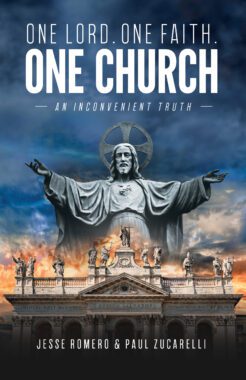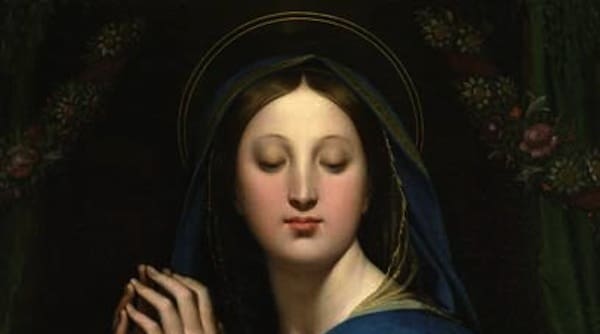A Reflection from “One Lord, One Faith, One Church” by Jesse Romero and Paul Zucarelli
The Church as the Living Bride of Christ
Jesus said to her, “Woman, believe me, the hour is coming when neither on this mountain nor in Jerusalem will you worship the Father.
You worship what you do not know; we worship what we know, for salvation is from the Jews.” (John 4:21–22)
Jesus Christ, as God Himself, tells two very important facts to the woman at the well. First, correct worship of God the Father will soon no longer occur in Jerusalem; and the mountain reference refers to the mountain upon which pagan temples were constructed at the time Jesus walked the earth. Secondly, and most importantly, Jesus states that “we” worship what we know, meaning the God of Israel is the true and only living God. Jesus concludes with absolute clarity, “For salvation is from the Jews.”
So, if salvation is from the Jews as Jesus said, how does this get conveyed to the modern Church? The word used in the original Greek Old Testament for “Israel in the wilderness” is the word ekklesia, the same word that the New Testament Gospels use for the word church. Therefore, the same word is used in both the Old Testament and that New Testament.
Prophecy of Mary
It is worth noting that the Old Testament is full of writings describing Israel as a “wandering daughter” whom God is calling back to Himself. In fact, these words are a prophecy of God’s chosen Bride who is to start His Christian Church and cause a New Covenant to be made by God with humanity. It is the prophecy of Mary, the Jewish Mother of Jesus Christ, Spouse of the Holy Spirit, and Daughter of the God of Israel. She had to be Jewish.
“How long wilt thou be dissolute in deliciousness, O wandering daughter? For the Lord hath created a new thing upon the earth: Woman shall compass a man” ( Jer. 31:22, DRA). If you research the Douay-Rheims version, the text “A woman shall compass a man” is in fact comprised of all capitalized letters! Some may think that God’s creation story was a one-and-done thing and only addressed in Genesis. Well, God is constantly creating—look to the Heavens for proof. Here God says that He will create something new on earth post-Genesis—woman shall compass a man. Mankind fell through a woman (Eve). Mankind will be restored through a woman (Mary). The Son of God
chose His Mother before the beginning of time.
St. Jerome wrote that this sentence is the image and reference to the Infant Jesus enclosed in Mary’s womb. Throughout his writing, the prophet Jeremiah uses beautiful marital imagery in his descriptions of a restored Israel. Did you ever wonder why Jesus refers to His mother as “Woman”? It is because that was Eve’s name before the fall. Woman in the Greek Septuagint can translate to “wife” or an unmarried woman. Nonetheless, it is a term of endearment and respect for a female. Therefore although her human name was Mary, Jesus always refers to her as “Woman.” Remember, Jesus has two natures: human and divine, but of one essence simultaneously. Well, if God created Adam originally from the dirt and woman from Adam, then in Genesis, God originally created only man and from that man, woman came to be.
So, what does Jeremiah’s recorded prophecy mean? If man fell through the initial causality of the disobedience of a woman in the garden, then God must restore mankind to Himself through a woman, one who would give birth to the sinless, perfect Man who would also have to go through immolation for all mankind’s sins in order to restore us with God, the Father. The word compass is a transitive verb, meaning “to devise or contrive often with craft or skill” or “to bring about, achieve, or accomplish something; to obtain.” This definition is from merriam-webster.com meanings (1) and (3, a, b). God said it, we didn’t. He will create a man from a woman, and from this Man who is
the Christ, Israel will be restored (see Matt. 15:24), so that in and through the Church, now called the Israel of God, the entire world may have salvation in His Name (the Gentiles included).
Jeremiah 31 should be read in its entirety. It is the only place in the Old Testament that the words New Covenant appear. After God says that He will create something new on earth—namely, bringing about and accomplishing with craft and skill the perfect, sinless man of divine origin created and housed within a woman—He states that only then will He declare a New Covenant: “Behold, the days are coming, says the Lord, when I will make a new covenant with the house of Israel and the house of Judah. . . . But this is the [new] covenant which I will make with the house of Israel after those days, says the Lord” ( Jer. 31:31, 33).
To add further support to these Scripture verses, we turn to the New Testament. Biblical scholars ponder who first documented the Incarnation of the Word made flesh ( Jesus Himself) in the New Testament. Many will answer St. Luke. The correct answer is St. Paul, who we know trained Luke to a great degree. We also know that Paul’s knowledge of the gospel is not of man but of divine origin, as he states in Galatians 1:11–12. His knowledge was given to him by divine revelation from the glorified Jesus Himself. Notice what St. Paul shares in Galatians: the first written words describing what God did to whom and why concerning the Incarnation of the Word made flesh. It matches the prophecy that Jeremiah wrote about Mary, Jesus, and salvation for the entire human race.
“But when the fulness of the time was come, God sent his Son, made of a woman, made under the law: That he might redeem them who were under the law: that we might receive the adoption of sons” (Gal. 4:4–5, DRA). St. Paul says a lot here. Let us unpack it: 1) in God’s perfect timing, God would send His Son; 2) He was to be a man made of a woman who was under the Jewish Law—Mary; and 3) their Son would redeem Israel and the Gentiles would receive their adoption as sons (and daughters) of God—the Abrahamic Covenant. Direct and straightforward, yet it needed unpacking. So, why would God even need a woman? Because Jesus had to have a human nature. His human nature was given to Him by His Mother, the “Woman,” Mary. She gave Him His blood, His human tissue, and His physical heart. These human bodily components are critically necessary for the immolation of Our Lord, the atoning sacrifice for you and me. Without Mary, there would be no blood to be shed for sin, no heart to pierce, and no flesh to scourge and crucify. Mary provided Jesus’ human nature and God provided His Son’s divine nature, and the Paschal Lamb came to be for our salvation. From Eve all mankind fell and from Mary’s womb mankind is restored to eternal life in Jesus who is son of Mary (Mark 6:3) and Son of God.
To purchase this book, please visit one of the links below.
_

This article on ‘Jesus’ love for Mary proves “Woman” isn’t a bad word’ is adapted from the book One Lord, One Faith, One Church by Jesse Romero and Paul Zucarelli which is available from Sophia Institute Press.
Art for this post on a reflection from “One Lord, One Faith, One Church” by Jesse Romero and Paul Zucarelli ; cover used with permission; Photo used in accordance with Fair Use practices.




